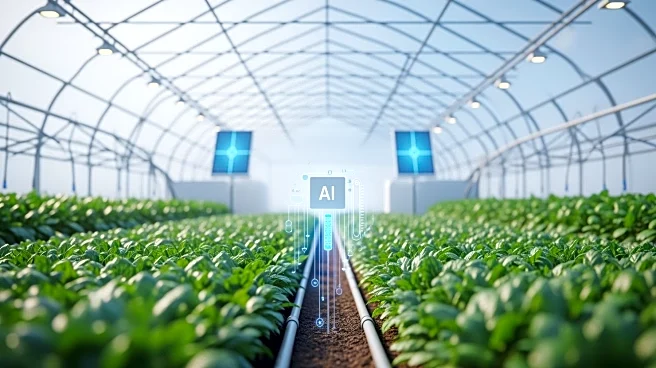What's Happening?
Artificial intelligence (AI) is revolutionizing agriculture by integrating fragmented data and providing real-time insights to enhance efficiency and yields. Guillermo Medina, Chief Digital Officer at Pantaleon Sugar Holdings, highlights AI's role in regenerative
practices such as biochar application and microbial soil enrichment. These methods improve carbon sequestration and soil health, turning agriculture into a climate solution. AI-driven precision agriculture optimizes inputs like water and fertilizers, potentially increasing crop yields by up to 25%. The market for AI in agriculture is projected to grow significantly, reflecting its impact on sustainable farming practices.
Why It's Important?
AI's integration into agriculture is crucial for addressing climate change challenges, such as weather volatility and resource scarcity. By enhancing efficiency and sustainability, AI helps farmers make informed decisions, reducing waste and improving productivity. This technological shift supports the transition from extraction to regeneration, promoting healthier soils and ecosystems. As AI continues to evolve, it offers a pathway to resilience, enabling agriculture to thrive in harmony with the planet and contributing to global food security.
What's Next?
The adoption of AI in agriculture is expected to accelerate, with ongoing developments in data-driven strategies and regenerative practices. As AI tools become more accessible, farmers will increasingly rely on them for precision agriculture, optimizing resource use and minimizing environmental impact. The focus on sustainable practices, such as biochar and microbial soil enrichment, will likely expand, further enhancing carbon sequestration and soil health. Collaboration between technology providers and agricultural stakeholders will be key to realizing the full potential of AI in farming.
Beyond the Headlines
AI's role in agriculture extends beyond immediate productivity gains, offering long-term benefits for environmental sustainability and climate resilience. By fostering innovation and collaboration, AI can transform traditional farming practices, creating a legacy of abundance for future generations. The integration of AI with regenerative methods highlights the potential for technology to address global challenges, such as climate change and food security, through sustainable agricultural practices.
















